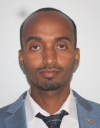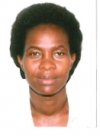Hedmon Okella
ID:
|
Screening and Characterization of antimicrobial peptides from fish mucus in three major lakes of Uganda
REFNo: HS449ES
i. Determine the antimicrobial activity of skin mucus from selected fish species obtained from three major lakes of Uganda
ii. Identify the most potent antimicrobial peptides isolated from skin mucus
iii. Evaluate the toxicity of the most potent antimicrobial peptides
iv. Determine the mechanism of action of the most potent antimicrobial peptides
|
Uganda |
2019-10-07 |
2022-10-07 |
Medical and Health Sciences |
|
Degree Award |
.jpeg)
|
TINO OKEDI KEVIN
ID:
|
OUTCOMES OF END TO END VERSUS OVERLAPPING TECHNIQUES OF REPAIR OF CHRONIC OBSTETRIC ANAL SPHINCTER INJURY, A RANDOMISED CONTROLLED TRIAL
REFNo: HS460ES
GENERAL OBJECTIVE:To compare the outcomes of end to end versus overlapping techniques of repair of chronic 3rd and 4th degree perineal tears in MNRH.
SPECIFIC OBJECTIVES:
i. To compare the proportion of patients with flatal-faecal incontinence 3 months post operatively following repair of chronic third and fourth degree perineal tears with end to end versus overlapping techniques of repair in MNRH.
ii. To compare the proportion of patients with complications; wound breakdown and perineal pain 3 months post operatively following repair of chronic third and fourth degree perineal tears with end to end or overlapping techniques of repair in MNRH.
|
Uganda |
2019-10-07 |
2022-10-07 |
Medical and Health Sciences |
|
Degree Award |

|
Kemirembe Goretti Maria
ID:
|
MICROFINANCE SERVICES AND WOMEN’S ECONOMIC EMPOWERMENT IN KYAMUHUNGA PEOPLES’ SACCO.
REFNo: SS361ES
i. To determine the effect of access to microcredit services and selected indicators of women’s economic empowerment.
ii. To determine the relationship between access to financial advisory services and indicators of women’s economic empowerment.
iii. To examine the effect of microfinance savings and selected indicators of women’s economic empowerment.
|
Uganda |
2019-10-07 |
2022-10-07 |
Social Science and Humanities |
|
Degree Award |

|
NIGHT MUHINDO PRIMER
ID:
|
cash management and financial performance of tea processing firms in Bushenyi district. a case of Igara Growers Tea factory.
REFNo: SS364ES
1.To establish the relationship between liquidity management and financial performance of igara growers tea factory
2. To examine the relationship between working capital management and financial performance of igara growers tea factory
3. To show the relationship between financial information management and financial performance of igara growers tea factory.
|
Uganda |
2019-10-07 |
2022-10-07 |
Social Science and Humanities |
|
Degree Award |

|
Martin Amanya
ID:
|
IMMUNOMODULATORY EFFECTS OF ARTAVOL®IN MALARIA PROPHYLAXIS USING A MOUSE MODEL
REFNo: HS465ES
1. To assess the cellular immune response to malaria parasites after treatment with ARTAVOL®
2. To determine the humoral immune response to malaria parasites after treatment with ARTAVOL®
3. To study the effect of crude flavonoids from ARTAVOL® on cytokine production.
|
Uganda |
2019-10-07 |
2022-10-07 |
Medical and Health Sciences |
|
Degree Award |

|
Lwanga Jonathan
ID:
|
Prediction modelling for Infectious Diseases and Outbreak prevention
REFNo: HS473ES
To determine patterns of flow of outbreaks
|
Uganda |
2019-09-26 |
2022-09-26 |
Medical and Health Sciences |
|
Non-degree Award |

|
Serawit Chorito Deyno
ID:
|
ANTIBACTERIAL EFFECT AND SAFETY OF ESSENTIAL OIL FROM ECHINOPS KEBERICHO
REFNo: HS398ES
1.3. Objective of the study
Major objective
• To evaluate the antibacterial effect and safety of EO from E. Kebericho
Specific objectives
1. To identify and isolate main components of the EO from E. kebericho
2. To determine antibacterial activity of EO and its combined effect with existing antibiotics against S. aureus and P. aeruginosa
3. To determine antibacterial activity of main constituent of EO and its combined effect with existing antibiotics against S. aureus and P. aeruginosa
4. To examine acute and sub-acute toxicity of the EO from E. kebericho
|
Ethiopia |
2019-09-19 |
2022-09-19 |
Medical and Health Sciences |
|
Degree Award |

|
Heather Brown
ID:
|
Evaluating the Impact of a Layperson EMS System on Morbidity and Mortality of Injured Patients in Masindi, Uganda
REFNo: HS414ES
The purpose of this study is to evaluate the effectiveness of a pilot layperson EMS system for commercial boda drivers and the feasibility of using a pre-existing trauma registry to evaluate the outcomes of these patients.
Primary Objective:
Evaluate the impact of a boda driver EMS system on time to presentation for ill and injured patients.
Secondary Objectives:
1. Evaluate the purpose and rate of utilization for a lay person EMS system in Masindi, Uganda.
2. Evaluate the impact of a lay person EMS system on patient morbidity and mortality at MKMC.
|
USA |
2019-09-19 |
2022-09-19 |
Medical and Health Sciences |
|
Non-degree Award |

|
Sona Shah
ID:
|
Validation of the safety and performance of a clinical vital signs monitor on infants and neonates: A pilot study
REFNo: HS420ES
1. To assess the safety of the Neopenda wearable vital signs monitor (neoGuard) in healthy infants (aged 8 to 16 weeks) and stable neonates (aged 0-28 days)
2. To determine the performance accuracy of neoGuard device in comparison to a gold standard monitor comparable to the Edan M3A Vital Signs Monitor
|
USA |
2019-09-19 |
2022-09-19 |
Medical and Health Sciences |
|
Non-degree Award |

|
Mary Namubiru
ID:
|
Meet Your Future Job Search Effort and Aspirations of Young Jobseekers
REFNo: SS338ES
Jobseekers in developing contexts face a number of search barriers to quality employment. The most recurring ones in the literature range from liquidity constraints for travel costs (Abebe et al. 2017a) to high opportunity cost of search-time due to job availability in the informal sector (Franklin, 2017). In addition to these, young jobseekers often do not know how or where to search for jobs, might not understand their skills in relation to what employers want and are likely to have distorted expectations of wage levels and working conditions (Babcock et al. 2012). Importantly, these barriers are magnified right in the most vulnerable phase of a career: the transition into the labor market (Becker 1994, Pissarides 1994). This study seeks to investigate (i) how barriers in access to information affect search efforts, labor outcomes and aspirations of young jobseekers taking their first step in the job market, (ii) how can career-coaching and job search assistance from “the future you†help influencing their expectations and labor market trajectories and (iii) how does the trainees’ degree of identification with “the future you†affect the way in which they interpret somebody else’s experience with respect to their own future. The experimental setting is that of Vocational Training Institutes (VTIs) in Uganda and “the future you†is an alumnus of the VTI, who successfully entered the labor market after receiving the training.
|
Uganda |
2019-09-19 |
2022-09-19 |
Social Science and Humanities |
|
Non-degree Award |

|
Wyatt Brooks James
ID:
|
Community Lending and Outside Capital (CLOC)
REFNo: SS339ES
To measure the impact of community lending and outside capital on SILC members’ returns and default rate behavior, levels of liquid savings, and change in livelihood.
|
USA |
2019-09-19 |
2022-09-19 |
Social Science and Humanities |
|
Non-degree Award |

|
Fabien Schultz
ID: UNCST-2023-R008622
|
Self-medication in wild chimpanzees and mountain gorillas
REFNo: NS104ES
Observation of novel medicinal plants used for self-medication by wild chimpanzees and mountain gorillas:
The fieldwork at the field stations in Bulindi, Kibale Forest National Park, Budongo Forest Reserve, and Bwindi Impenetrable National Park will result in the documentation of potentially novel medicinal plant species used by great apes in Uganda, which will be reported in our publications.
Comparison between self-medication behavior in chimpanzees at different locations:
The study will generate a comparison between plants and self-medication techniques used by Bulindi chimpanzees (a highly disturbed habitat shared with humans) and Kibale/Budongo chimpanzees (less disturbed habitats).
Impact on modern medicine:
Through this study, we seek to integrate behavioral data with novel pharmacological screenings of plants. Without doubt, the evolution of self-medicative habits from the great apes to early hominids and modern humans has important implications for modern medicine. This project would significantly advance previous research on zoopharmacognosy (or “ape-pharmacognosyâ€).
Discovery of new plant and insect species and first-time pharmacological investigation of medicinal natural remedies:
I estimate that around 60% of all plant and insect species in the dense rainforests of Western Uganda and Eastern Democratic Republic of Congo remain undiscovered. As such, this project could result in the discovery of novel species, but most likely in the documentation and evaluation of novel medicinal uses in known plants. The majority of plant species used in self-medication by wild chimpanzees and mountain gorillas in the tropical rainforests of Uganda have never been screened for pharmacological activity in a lab or investigated with regard to their chemical composition.
Conservation of biodiversity:
Wild mountain gorillas are classified as Critically Endangered and chimpanzees as Endangered by the International Union for Conservation of Nature. Both great apes are highly threatened by human encroachment, forest degradation, regional political instability and disease. Through our workshop within local communities, we aim to raise awareness of the importance of protecting these creatures as well as local medicinal plants.
|
Germany |
2019-09-19 |
2022-09-19 |
Natural Sciences |
|
Non-degree Award |

|
Christine Wiltshire Sekaggya
ID: UNCST-2019-R000578
|
The utility of urine Lipoarabinomannan as a Tuberculosis treatment monitoring tool.
REFNo: HS432ES
To describe the temporal changes of urine LAM during the first 2 months TB treatment of TB-HIV co-infected patients.
To determine the correlation between urine LAM and microbiological response measured by sputum culture among TB-HIV co-infected patients receiving anti-TB treatment.
|
Uganda |
2019-09-10 |
2022-09-10 |
Medical and Health Sciences |
|
Non-degree Award |
.png)
|
Richard Muwanika
ID:
|
DEFINING DIAGNOSTIC PERFORMANCE, ANALYTICAL AND OPERATIONAL SUITABILITY FOR POINT OF CARE DEVICES FOR HEMOGLOBIN ESTIMATION DEVICES IN ROUTINE HIV AND MATERNITY CARE IN UGANDA
REFNo: HS437ES
1) To evaluate the analytical performance (accuracy and precision/repeatability) of the available non-investigational Hb POC devices in use in Uganda
2) To evaluate the diagnostic performance (sensitivity, specificity, Positive and Negative Predictive values) of the available Hb POC devices in Uganda
3) To evaluate the operational suitability of the available Hb POC devices in Uganda using a standardized scorecard
4) To determine the operational cost and cost-effectiveness of the available Hb POC devices in Uganda
|
Uganda |
2019-09-10 |
2022-09-10 |
Medical and Health Sciences |
|
Non-degree Award |

|
Dunstan Kalanzi
ID:
|
EXPLORING THE ASSOCIATION BETWEEN PERIODONTAL DISEASE AND THE RISK OF ALZHEIMER’S DISEASE AND RELATED DEMENTIAS: A COMPARATIVE STUDY
REFNo: HS438ES
To determine the periodontal health status of a community-based cohort of elderly persons and factors associated with Alzheimer’s disease and related dementias in Uganda
|
Uganda |
2019-09-10 |
2022-09-10 |
Medical and Health Sciences |
|
Non-degree Award |

|
EDITH NAKKU-JOLOBA NAKKU
ID: UNCST-2021-R013931
|
Performance of a novel, rapid Neisseria gonorrhoeae genotypic and phenotypic test and estimation of prevalence of 4 STI in a gonococcal surveillance program in Uganda
REFNo: HS455ES
Primary:
• To determine the accuracy (correlation, sensitivity, specificity) of a new mobile, dual purpose gonorrhea point-of-care (POC) STI test device [the Mobile NAAT (MobiNAAT)] against reference laboratory methods for diagnosis (Gram stain and/or culture).
Secondary:
• To determine agreement between self-collected meatal swabs and urine samples for the diagnosis of STI using a gold standard NAATs in Ugandan men (a population with high NG positivity).
• To assess acceptability of self-collected tests in men with UDS in Uganda.
• To validate MobiNAAT for gonorrhoea ciprofloxacin AMR in symptomatic men compared with gold standard (culture & disk diffusion).
• To estimate the prevalence of the following 4 STIs in a population of men with UDS: Chlamydia trachomatis (CT), Neisseria gonorrhoea (NG), Trichomonas vaginalis (TV), and Mycoplasma genitalium (MG) using NAATs.
• To compare sensitivity and specificity of GC NAAT with microscopy and culture in Ugandan samples.
• To assess the prevalence of HIV, syphilis and viral hepatitis, and compare HIV result to self-reported HIV status.
• To explore socio-demographic, behavioural and clinical factors associated with positive STI diagnosis (including NG NAAT-positive and NG culture-negative status).
• Determine the proportion of non-reportable results (unresolved, indeterminate and incomplete).
• Test other STI diagnostics in future on available samples.
|
Uganda |
2019-09-10 |
2022-09-10 |
Medical and Health Sciences |
|
Non-degree Award |

|
David Meya Bisagaya
ID: UNCST-2019-R000837
|
High Dose Oral Rifampicin to Improve Survival from Adult Tuberculous Meningitis: A Double-blinded Randomised Controlled Phase III Trial. HARVEST trial
REFNo: HS428ES
Our primary objective is: To determine if high dose rifampicin, delivered orally at ~35 mg/kg/day for 8 weeks, is safe and improves 6-month survival compared to standard of care (rifampicin 10 mg/kg/day) for patients with TBM.
Secondary objectives are to compare the high dose rifampicin regimen to the standard of care regimen for:
1. 12-month survival
2. Neurological disability and functional outcomes from TBM
3. Safety and tolerability
4. Hospital outcomes related to TBM
5. Subsequent neurologic deterioration
6. Management of drug-induced liver injury
Tertiary objectives are to:
1. To describe the pharmacokinetics (PK) of high dose rifampicin in plasma and CSF, assess predictors of exposure to rifampicin in plasma and CSF, assess PK-PD relationships also considering exposures to the other first-line TB drugs and ART in HIV-infected patients, and determine the minimally desired rifampicin exposure for optimal treatment of TBM.
2. To determine the cost-effectiveness of the intervention.
3. To determine appropriate TBM diagnostic algorithms
|
Uganda |
2019-09-05 |
2022-09-05 |
Medical and Health Sciences |
|
Non-degree Award |

|
Kevin Hunt Dean
ID:
|
DRY HABITAT CHIMPANZEE ECOLOGY: IMPLICATIONS FOR HUMAN
EVOLUTION
REFNo: NS101ES
Document feeding, social and locomotor behavior using 1-minute focal observations. Record food items, ranging behavior, canopy use, feeding rate and habitat use. Collect hairs for trace element analysis. Collect skeletal material from any deceased individuals. Analyze skeletal material for distinctive characteristics. Analyse hormone profiles to determine if lower levels of aggression are due to low T levels. Look for poisons in Muguri River to find source of sex organ abnormalities. Examine dental micro wear and trace elements in hair to determine diet. Look at genetic variations
|
USA |
2019-09-05 |
2022-09-05 |
Natural Sciences |
|
Non-degree Award |

|
Sangjin Kang
ID:
|
Establishment of libraries of indigenous medicinal plants in Mount Elgon area
REFNo: NS86ES
To conserve knowledge and resources about indigenous medicinal plants in Mt. Elgon area through activities such as;
|
Republic of Korea Reunion |
2019-08-27 |
2022-08-27 |
Natural Sciences |
|
Non-degree Award |
.jpg)
|
Mushagalusa Kasali Félicien Kasali
ID:
|
Phytochemical and Pharmacological Study of Chenopodium ambrosioides L. and Physalis peruviana L., herbs used to treat diabetes in Congolese Traditional Medicine
REFNo: HS440ES
1. To test the activity of the bioguided fractions of the extracts obtained in-vivo, on acute, sub-acute and chronic hyperglycemia in experimental rats.
2. To determine the zootechnical, biochemical and histopathological markers of the extracts obtained in experimental rats.
3. To isolate and elucidate the structure of the bioactive components of the extracts obtained.
|
Democratic Republic of Congo |
2019-08-27 |
2022-08-27 |
Medical and Health Sciences |
|
Degree Award |

|
| View |
|
Sort By: |
|
|
|
| |
|